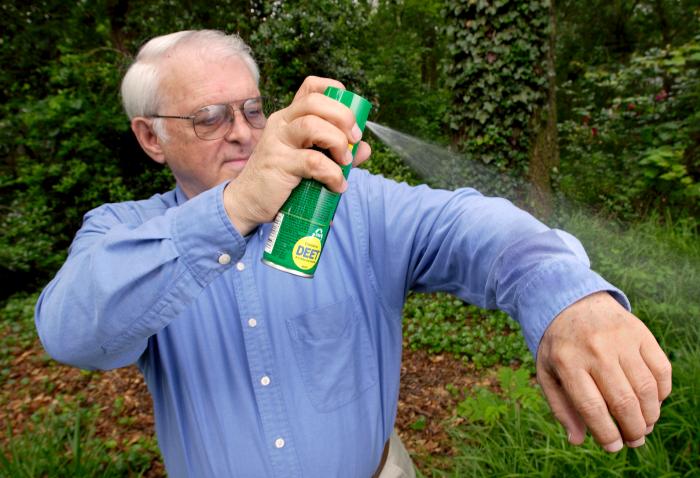Mosquitoes
Information about mosquitoes and preventing West Nile
Mosquito bites can be more than just annoying and itchy. They can make you really sick. See below for how to mitigate mosquitoes and prevent bites, and what the City can do to help.
Prevent Bites with the 4 D's
Drain
Mosquitoes breed in water! Drain any standing water in your yard each week. Eliminate standing water in:
- Buckets, flower pots, pet water dishes
- Gutters
- Tree holes
- Abandoned swimming pools or tires, drainage ditches and other areas
Dress

Wear lightweight, long-sleeved shirts and long pants while outdoors. Spray clothing with insect repellent, since mosquitoes can bite through clothing.
DEET
All day, every day: Whenever you are outside, use insect repellent that contains DEET, picaridin or oil of lemon eucalyptus. Apply insect repellent sparingly to exposed skin. Use an approved repellent according to its label.
Dawn/Dusk
Limit time spent outdoors at dawn or dusk, when mosquitoes are most active and feeding.
Mosquito-Proof Your Home
- Install or repair screens on windows and doors to keep mosquitoes outside. Use your air conditioning, if you have it.
- Take the following steps to prevent mosquito breeding on your property:
- Destroy or dispose of tin cans, old tires, buckets, unused plastic swimming pools or other containers that collect and hold water.
- Do not allow water to accumulate in containers like the saucers of flowerpots, cemetery urns or in outdoor pet dishes for more than 2 days.
- Change the water in birdbaths and wading pools at least once a week.
- Stock ornamental pools with top feeding minnows. Ornamental pools may be treated with biorational larvicides [Bacillus thuringiensis subsp. israelensis (Btu) or S-methoprene (IGR) containing products] under certain circumstances. The chemicals can be purchased from your local home improvement store.
- Fill or drain puddles, ditches and swampy areas. Remove, drain, or fill tree holes and stumps with mortar.
- Check for trapped water in plastic or canvas tarps used to cover boats, pools, etc. Arrange the tarp to drain the water.
- Check around construction sites or do-it-yourself improvements to ensure that proper backfilling and grading prevent drainage problems.
- Irrigate lawns and gardens carefully to prevent water from standing for several days.
Zika Virus
The best way to avoid Zika virus and other mosquito-borne illnesses is to protect yourself from mosquito bites.
Keep mosquitoes outside: Use air conditioning or make sure you repair and use window/door screens.
Pregnancy/Breastfeeding
Limit sexual transmission of Zika virus:
- Pregnant women and their male partners should discuss the potential exposures with their care provider. More information from the CDC.
- Men with a pregnant partner should use latex condoms the right way every time during sex, or abstain from sexual activity for the duration of the pregnancy.
At this time there is not evidence Zika virus is transmitted through breastmilk. The CDC believes the benefits of breastfeeding outweigh possible risks of transmitting Zika virus to an infant.
West Nile Virus
West Nile virus (WNV) is most commonly transmitted by mosquitoes. You can reduce your risk of being infected with WNV by using insect repellent and wearing protective clothing to prevent mosquito bites.
There are no medications to treat or vaccines to prevent WNV infection. Fortunately, most people infected with WNV will have no symptoms. About 1 in 5 people who are infected will develop a fever with other symptoms. Less than 1% of infected people develop a serious, sometimes fatal, neurological illness.
The City of St. Louis does not test birds or mosquitoes for West Nile virus because it is considered to be endemic in the area. See more information about mosquitoes and West Nile virus, including ways to protect against West Nile virus.
Fogging Services
The Department of Health conducts precautionary mosquito fogging to help reduce the mosquito population. If you would like your block fogged please make a service request to the City of St. Louis Citizens’ Service Bureau (CSB). You can also contact the CSB if you do not want fogging conducted around your property.